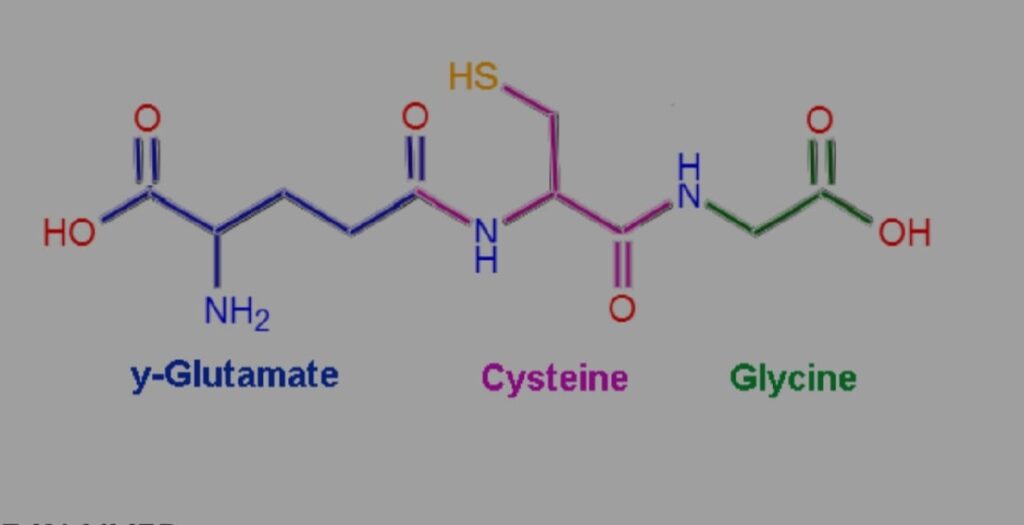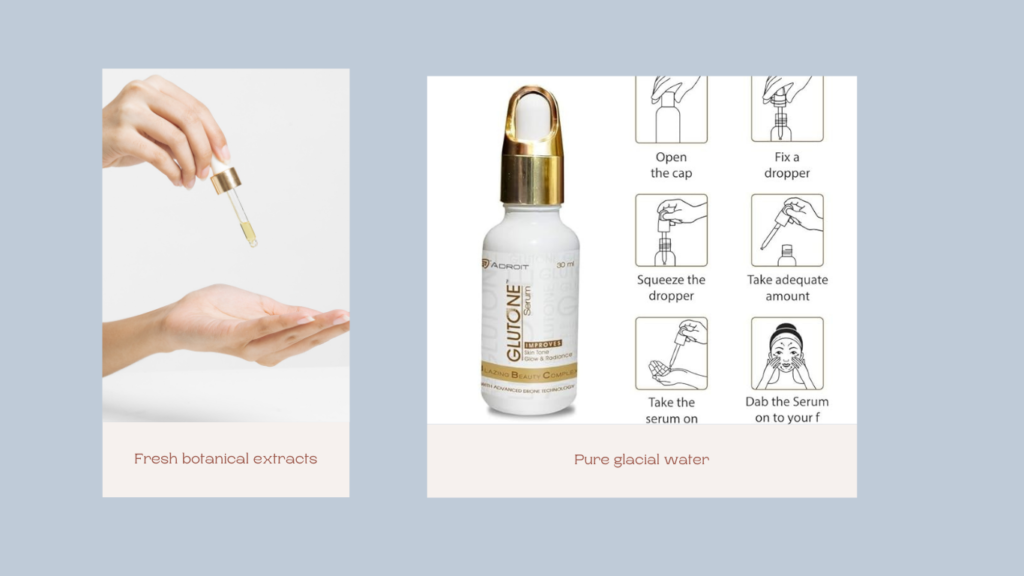Glutathione is a relatively simple molecule that is produced naturally all the time in the liver. Glutathione is the combination of three simple structure blocks of protein or amino acids i.e. Cysteine, Glycine and glutamine. It is a tripeptide molecule that has gamma peptide linkage between the carboxyl group of glutamine and cysteine and the carboxyl group of cysteine is linked with glycine with normal peptide bond. Glutathione is an antioxidant in plants and animals.
The structure of glutathione contains -the SH group that acts like a flypaper and all the bad free radicals, peroxides lipid, peroxides, or other heavy essence the glutathione may be reduced due to poor diet, pollution, toxins aging, injections, stress, trauma, medications, and radiations after 25years of age the production of glutathione in the liver gets slow when the level of glutathione is depleted then it creates the condition where the body has to decide whether to use it for the muscular system for supporting the immune system or for any other functions.
PRODUCTION OF GLUTATHIONE IN LIVER
The product of glutathione in the liver gets started once we eat food containing amino acids and Sulphur plays an important or major role in detoxification reaction in the liver.
The glutamate and glycine are usually available in most diets but cysteine is a limiting factor of GSH production. Glutathione exists in two interconvertible forms
Reduced glut (GSH)
Oxidized glut (GSSG)
GSH is the predominant intracellular form which acts as a strong anti-oxidant and depends on the poison’s components and xenobiotics
The GSH constantly gets oxidized to GSSG by the enzyme glutathione peroxidase
The glutamine gets converted into gamma-glutamylcysteine in the presence of cysteine and finally to glutathione in the presence of glycine.
GLUTATHIONE RICH FOODS
• Eggs
• Legumes
• Broccoli
• Spinach
• Watermelon
• Asparagus
• Avocados
• Garlic
• Onions
• Dairy products
• Nuts and seeds
• Meat and seafood
• Turmeric extract
• Cucumber
• Green tea
• Papaya
• Cauliflower
• Orange
• Guso seaweed
• Flax seeds
• Brussels sprouts
• Milk thistle
• Whey
BENEFITS OF GLUTATHIONE
✓ Improves the skin
✓ Boost the immune system
✓ Improves quality of sleep and elevates mood
✓ Increases energy and stamina
✓ Slow down the aging process
✓ Reduces the effects of stress
✓ Athletic performance and recovery
✓ Improves mental focus and clarity
✓ Detoxifies the liver and cells
✓ Reduces muscle and joint discomfort
✓ Lowers high cholesterol profile
✓ Improves vision
✓ Helps to maintain proper pH balance
✓ Decrease sugar cravings and the desire for alcohol
✓ Increases cardiac output and stamina
✓ Decrease body fat
✓ Normalizes blood pressure
✓ Helps to maintain a healthy digestive tract
✓ Regenerating vitamin C and vitamin E
✓ Assisting regular cell death (a process known as apoptosis
✓ Transporting mercury out of the brain
✓ Preventing cancer progression
✓ Reducing ulcerative colitis damage
✓ Protects from environmental toxins and free radicals
✓ Modulates insulin resistance
✓ Reduce respiratory disease
✓ Fights autoimmune disease
✓ Reduce symptoms of Parkinson’s disease
✓ Controls inflammation
Glutathione Skin Whitening Soap
Glutone Skin Brightening Serum
Glutathione Day And Night Cream For Men & Women
GLUTATHIONE FOR SKIN
It has strong antioxidant and anti-melanogenic properties and has recently become the most popular systemic skin-lightening molecule. The most effective route of administration of glutathione for the skin is an intravenous route. The reduced form GSH has depigmenting properties.
The glutathione exhibits anti-melanogenic properties (inhibition of melanin production) by following three mechanisms.
1) Inhibit the tyrosine enzyme which is responsible for skin tan
2) skewing of melanogenesis from the darker eumelanin to lighter phaeomelanin
3) removes the free radicals from the body
Benefits of Glutathione for Skin
Reduce wrinkles
Reduce fine lines
Reduce pigmentation
Reduce dark spots and acne marks
Skin whitening
Anti-aging
Protects skin from sunlight and pollution
Clear complexion
Provides elasticity
Rejuvenates skin
Side Effects of Glutathione
Loss of hair
Hair whitening
Nausea
Diarrhea
Pain in the breast or chest
Vision problems
Skin rashes
Numbness
Hives
LIPOSOMAL GLUTATHIONE
The reduced form of glutathione (GSH) is in the active state and can help to neutralize the free radicals including peroxides, heavy metals, etc in the body. Liposomal glutathione are those glutathione that have undergone a special process called microencapsulation, which encapsulates the glutathione molecule inside the lipid. This protects the
glutathione molecule and improves maximum absorption.
Liposomal glutathione is a concentrated dose of glutathione that usually contains other ingredients. Vitamin C and vitamin E are commonly paired with liposomal glutathione and aid in support and recovery. While we can get small doses of glutathione from spinach, asparagus, avocados, and other foods containing sulfur, liposomal glutathione is one of the best ways to get a concentrated dose of glutathione.
Liposomal glutathione shows a great way of improving cellular function, proper respiration, and even oxidation. It is also a core component to protecting the immune system and aids the cells that are responsible for the defense against infections and viruses.
ADMINISTRATION OF GLUTATHIONE
There are many routes for the administration of glutathione, mainly based on the comfort of the individual.
Oral formulations
Glutathione pills
sublingual tablets
syrups and sprays.
There are three major routes of administration used for skin whitening are
Topical creams
Face wash
Face topical spray
GLUTATHIONE CREAMS
these are the topical preparations applied on the surface of the skin it contains anti-bacterial and anti-fungal properties
which helps in treating skin conditions including scars, and pigmentation, prevents sun damage, and brightens the skin.
Composition of creams
L- glutathione
Rose hips
kojic acid
Alpha lipoic acid
vitamin A
vitamin C
Avocado oil
vitamin E
Bearberry extracts
GLUTATHIONE IV THERAPY/GLUTATHIONE INJECTIONS
Intravenous administration is expected to deliver 100% bioavailability of glutathione. It delivers a much higher therapeutic dose that will enhance the efficacy and also provides a narrow margin of safety due to the possibility of overdose toxicity. After the systemic absorption, the glutathione breaks down into amino acids and is synthesized
intracellularly.
Skin whitening injections: the injections directly introduce glutathione into the bloodstream called systemic circulation and effectiveness leads to reducing hyperpigmentation, spots, acne, and brighter and even skin tone. These injections work by decreasing the concentration of melanin in the Skin.
Composition of injections
Glutamic acid
Vitamin C
Cysteine
Glycine
Dosage:
The dose of the glutathione injections is based on the individual needs usually injections are recommended thrice a
week for 4-8 weeks, followed by maintenance doses as needed.


